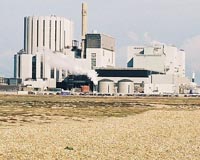 |
Buenos Aires (UPI) Feb 9, 2009 Amid deepening economic woes, Argentine consumers have been told they can look forward to more stable electricity supplies from the country's third nuclear power generation plant before the end of this year. Argentine power consumption has gone up with industrial growth and extension of modern amenities to the country's burgeoning middle classes. But supply has not kept pace with demand, and blackouts and outages in the capital are endemic, costing hundreds of thousands of dollars in lost productivity and perishable foods and other merchandise. The recent power and water shortages in neighboring Venezuela caused widespread concern in Argentina, which also experienced frequent outages. The government of President Cristina Fernandez de Kirchner played down their severity, but her critics said the shortages pointed to government failures. The shortages in Venezuela were blamed on chronic drought, but opposition critics of President Hugo Chavez also cited mismanagement. In Argentina, criticism has centered on inadequate modern amenities in the outlying rural areas due to poor infrastructure and bureaucratic neglect. Officials insist the impact of outages has been minimal. Opposition critics say the government takes little account of power breaks in the outlying areas of Argentina and refers only to blackouts in the capital. News of new electricity supply likely to join the national grid was announced by Planning Minister Julio De Vido, who said work had been advanced on the commissioning of the new nuclear power generation plant. The statement contrasted with his announcement in April 2009 that work on the Atucha II plant could not be finished before 2011. Argentina's nuclear power generation program dates back to the 1970s but was mired in controversy and environmental and factional politics. Argentina's former military dictators saw nuclear power as a military option and even attempted uranium enrichment and missile production. As a result, the end of the military regime in the 1980s led to the nuclear program being abandoned altogether. Argentina relaunched its nuclear power program nearly three years ago, as the government could argue for its urgent need amid worsening conventional energy supplies. The rising prices for oil and gas also enabled the government to make a convincing case for nuclear power. Currently Argentina imports gas from Bolivia and liquefied natural gas from Trinidad and Tobago. The Atucha II plant is expected to generate about 700 megawatts of electricity, but it is two decades late. Argentina's first nuclear power plant, the 360-megawatt plant Atucha I, came on stream in 1974, and the second plant, the 650-megawatt Embalse, began operations a decade later. However, nuclear power still accounts for no more than 5 percent of Argentina's electricity grid. De Vido said plans were under way to speed up the commissioning of the Argentine-Paraguayan Yacyreta hydroelectric plant this year. Once finished, the two projects will add 2,000 megawatts to the national power grid, he said. The completion of the Atucha II nuclear power plant and the hydroelectric plant will increase Argentina's total power generation capacity by about 10 percent, De Vido said.
Share This Article With Planet Earth
Related Links Nuclear Power News - Nuclear Science, Nuclear Technology Powering The World in the 21st Century at Energy-Daily.com
 Britain, India agree civil nuclear deal: ministers
Britain, India agree civil nuclear deal: ministersLondon (AFP) Feb 4, 2010 Britain and India have agreed the text of a deal on civil nuclear cooperation, ministers from both countries announced after talks in London on Thursday. "The two sides have discussed and negotiated a civil nuclear energy cooperation agreement and we hope that will be signed soon," Indian Commerce Minister Anand Sharma said during a visit for trade talks. His British counterpart, Busines ... read more |
|
| The content herein, unless otherwise known to be public domain, are Copyright 1995-2010 - SpaceDaily. AFP and UPI Wire Stories are copyright Agence France-Presse and United Press International. ESA Portal Reports are copyright European Space Agency. All NASA sourced material is public domain. Additional copyrights may apply in whole or part to other bona fide parties. Advertising does not imply endorsement,agreement or approval of any opinions, statements or information provided by SpaceDaily on any Web page published or hosted by SpaceDaily. Privacy Statement |